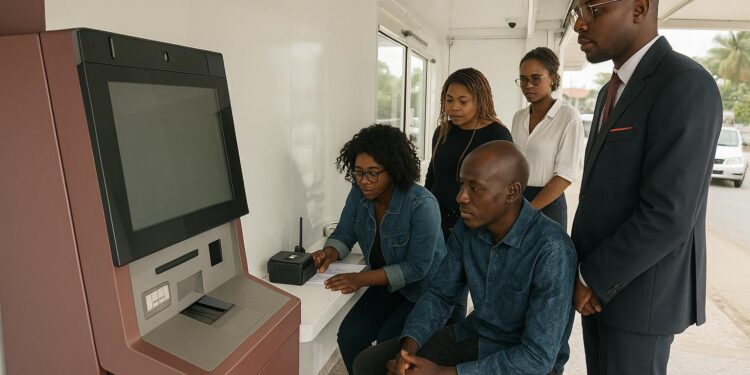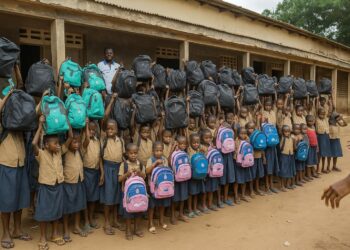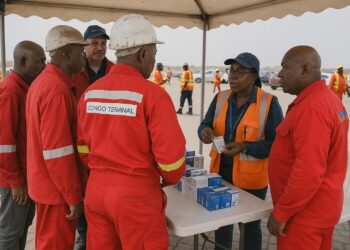Mobile vans redefine branch banking
The roar of a diesel engine is not the sound one usually associates with banking, yet on 10 October BSCA-Bank unveiled its first mobile banking vehicle, a fully fledged branch on wheels designed to carry current accounts, cash services and digital interfaces directly to Congolese customers.
The innovation, publicly showcased during the Independence Day parade on 15 August, aims to chip away at a stubbornly low financial-inclusion rate. Central bank data put the share of adults holding a formal account at barely 26 percent in 2022, below the CEMAC regional average (BEAC 2022).
Bringing services to underserved communities
By turning a heavy truck into a cloud-connected micro-branch, BSCA-Bank wants to reach those who live, trade or farm far from paved roads. Deputy retail director Olandzobo Bodegard Maoland frames the project as “bringing the bank where Congolese live, work and venture”, echoing the government’s call for inclusive growth.
The vehicle’s pilot run at civil-engineering firm MBTP, one of the bank’s corporate clients, allowed technicians to fine-tune satellite links, biometric scanners and portable ATMs. Engineers report that cash safes are bolted to the chassis and monitored via sensors feeding real-time alerts to headquarters.
On board, two tellers and one relationship officer can open accounts within minutes using e-KYC software aligned with the regional banking supervisor COBAC’s due-diligence rules. A solar array on the roof backs up the generator, a feature highlighted by staff as proof of environmental responsiveness.
Full-service offer supports inclusion agenda
Services mirror those of a classic branch: cash deposits, withdrawals, bill payments, wage disbursement for public servants and entrepreneurs, plus card issuance. For rural cooperatives, officers can bulk-register members on site, reducing travel costs that often exceed the value of a day’s transaction, observers note (Global Findex 2021).
Financial-inclusion analysts welcome the move, pointing out that branch penetration in Congo-Brazzaville stands at 3.2 branches per 100 000 adults compared with 5.7 in Cameroon (IMF FAS 2022). Mobile money agents fill some gaps, yet confidence rises when a licensed bank handles deposits, says consultant Mireille Doukaga.
The venture also aligns with President Denis Sassou Nguesso’s 2022–2026 National Development Plan, which singles out digital finance as a lever for SME formalisation and tax broadening. By capturing payroll flows, BSCA-Bank may help authorities map the informal sector without imposing abrupt compliance burdens.
Compliance, competition and investor outlook
Regulatory officials at the Ministry of Finance indicate that the van’s deployment satisfies existing licensing frameworks; no specific decree was required as long as the bank keeps a permanent address for legal notifications. Still, quarterly reports must detail each stopover and the volume of cash handled.
In the competitive arena, Ecobank and BGFI have relied mainly on agency arrangements in petrol stations and supermarkets. A rolling branch sets BSCA-Bank apart and could accelerate deposit growth, notes ratings agency Bloomfield in a recent issuer report, which maintains a stable outlook for the lender.
Early field evidence and logistical hurdles
Early customer feedback, collected during a two-week tour of northern districts, points to reduced queues in Pointe-Noire’s main branch and improved cash availability near sugar-cane plantations. Farmer Jean-Baptiste Okaga says he withdrew wages “in less than ten minutes, under the mango trees”, a novel experience.
Economists caution that logistics costs remain high. Fuel prices have climbed 14 percent year-on-year, and road conditions, especially during the rainy season, can slow the van to walking speed. BSCA-Bank has budgeted contingency funds and is negotiating with oil distributors for a bulk-purchase rebate, insiders reveal.
Financial literacy and social impact
Beyond transactions, the bank uses the van as a classroom, streaming financial-literacy modules on a fold-out screen. Topics range from savings discipline to agri-input credit lines under the African Development Bank’s TAAT programme, reflecting a holistic approach to empowerment endorsed by several local NGOs.
Scale-up plans and funding avenues
Analysts will watch whether the model can scale. The bank targets five vehicles by mid-2024, each projected to break even after eighteen months if they maintain a daily float of 90 million CFA francs. Funding discussions are ongoing with the French Development Agency, according to executives.
If successful, the experiment could inspire other service industries, from telecom top-up operators to micro-insurers, to adopt the roving-branch concept. For now, the blue-and-green livery of BSCA-Bank’s truck stands as a moving billboard for a policy ambition shared by regulators, businesses and households alike.
Lessons from abroad enrich local frameworks
Ultimately, the van is more than steel and circuitry. It crystallises the proposition that access to finance is a public good—one that can be delivered on a dusty laterite road as effectively as on a boulevard in Brazzaville, provided innovation and governance steer in tandem.
International experience suggests the concept travels well. Kenya’s Equity Bank runs 26 vans, while Mexico’s Bansefi fleet covers mountainous Oaxaca. BSCA-Bank executives have exchanged notes with both institutions through the Alliance for Financial Inclusion, ensuring lessons are transplanted into Congo’s regulatory and cultural landscape, enriching today’s frameworks.











































